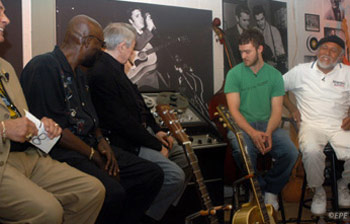With the push of a button, Elvis Presley' "That's All Right" went spinning around the world Monday on the 50th anniversary of one of rock 'n' roll's defining moments.
"That's All Right" was Presley's first professional recording, taped at Sam Phillips' Sun Studio on July 5, 1954, to begin a career that changed pop music everywhere.
For the anniversary, Scotty Moore, Presley's first guitarist, hit a button on a control board at Sun to begin a satellite broadcast of "That's All Right" at 11 a.m. CDT to 1,200 to 1,500 radio stations around the world.
Outside the small studio, a street party was under way with a series of area bands lined up to perform on a sound stage at Sun's front door.
Despite temperatures in the low 90s and practically no shade, more than 2,000 participants had turned out by early afternoon.
Presley was accompanied on "That's All Right" by Moore on guitar and Bill Black on bass. They had no drummer, and Black slapped his standup base hard to create a one-man rhythm section.
While "That's All Right" now enjoys a prominent place in the history of American music, it did not produce immediate fame for Presley and his colleagues.
"A lot of people think it was an overnight success, but we paid our dues for two years on the road in Mississippi, Arkansas, Tennessee, Texas before RCA picked us up," Moore said.
Music historians regard the recording of "That's All Right" as a milestone in American pop culture, but Presley fans who like to think of it as the beginning of rock 'n' roll may be getting a bit carried away.
"Elvis would be the first to say he didn't create rock 'n' roll. Rock 'n' roll came from an evolutionary process going back probably to the 1940s," said Kevin Kane, director of the Memphis tourism bureau.
"But there was a defining moment that took place on July 5th and we just figured this is as good a time as any to celebrate it," said Kane, a leading organizer of the celebration.
Sun Studio, which was called the Memphis Recording Service in the 1950s, played a larger role in the history of pop music than simply the place where Presley got his start.
Before Presley's arrival, Sam Phillips recorded blues and R&B artists including B.B. King, Howlin' Wolf, Little Milton and Rufus Thomas. He recorded Jackie Brenston's "Rocket 88" in 1951.
After "That's All Right," Phillips recorded other rock 'n' roll pioneers including Jerry Lee Lewis, Carl Perkins, Johnny Cash and Roy Orbison.
It's an old story now how Presley, Moore and Black weren't making much progress at their first recording session together.
Then Presley broke spontaneously into an upbeat version of "That's All Right," which was first recorded in 1946 by bluesman Arthur "Big Boy" Crudup.
Moore and Black joined in, and Phillips told them to keep on jamming.
"One thing I always enjoyed about Sam is he would let the artists and the musicians do their thing," Moore said. "He didn't guide you in any direction."
Isaac Hayes, who recorded for Memphis' Stax Records in the 1960s and 1970s, and Justin Timberlake, a Memphis native, joined Moore for the ceremony.
Hayes said Presley mixed gospel, country and blues into a blend that opened the way for other artists with nontraditional styles.
It has often been said, that because Presley was a white man who sounded black, he opened the way for black artists to get radio air time.
"He brought a lot of cultures together," Hayes said. "He brought a lot of music together."
At the street party, Phillip Lofton, 54, said he was convinced, despite what some others may say, that Memphis is the home of rock 'n' roll.
"This is history," he said, leaning back in a folding chair a few yards from Sun's front door. "This is where it started, absolutely."
Rock Fans Celebrate 50th Anniversary Of 'That's All Right'
By Woody Baird, The Associated Press, July 06, 2004 | Other